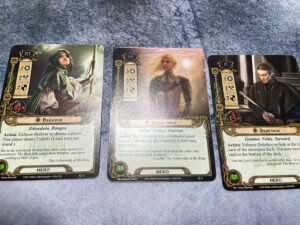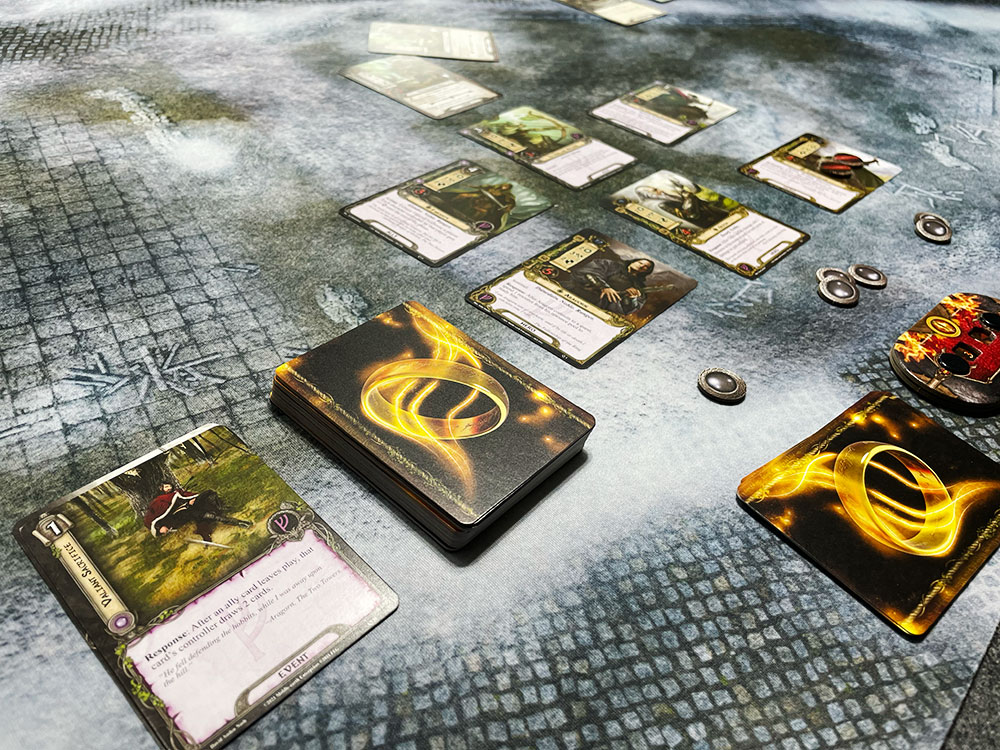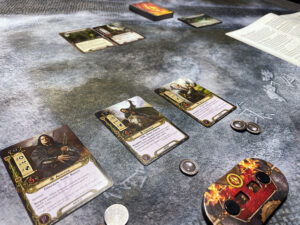 I am a big fan of Fantasy Flight Games Living Card Games. So, when the opportunity came up to review the newly repackaged Lord of the Rings LCG I jumped at the chance. I am a big collector of all things Lord of the Rings ever since I first read the books during my teenage years, so the idea of the game naturally pulled me in. Questing with characters throughout Middle Earth taking on a perilous quest and fighting the forces of shadow is everything I want in a Lord of the Rings game.
I am a big fan of Fantasy Flight Games Living Card Games. So, when the opportunity came up to review the newly repackaged Lord of the Rings LCG I jumped at the chance. I am a big collector of all things Lord of the Rings ever since I first read the books during my teenage years, so the idea of the game naturally pulled me in. Questing with characters throughout Middle Earth taking on a perilous quest and fighting the forces of shadow is everything I want in a Lord of the Rings game.
While the property is well loved does the card game still hold up and is it worth jumping in with the new packaging being released?
Gameplay Overview:
Each player takes control of a band of three heroes as they set out on a quest in Middle Earth. The heroes can be a mix of different spheres of influence, leadership, lore, spirit, and tactics. Each sphere specializes in its own playstyle and affects what cards can be played. Leadership is a support role that can inspire and command other heroes and is an all-purpose type of deck. Lore specializes in keeping characters alive and drawing cards. Spirit focuses on willpower and helping characters explore locations and progress on quest. Tactics is the heavily combat-focused deck that is great for both attacking and defending.

Different quests in Middle Earth will determine what cards are included in the encounter deck. Each quest will, of course, have different levels of difficulty and objectives that need to be met for the players to win. Each quest can be played as a stand-alone experience or as part of its campaign.
Each turn players start by gaining resources and playing ally and asset cards in preparation for their travels and quest. These allies and assets will help players quest, fight, and defend themselves.
Players then must decide on how many of their characters to commit to questing. The more heroes committed to the quest the faster challenges can be overcome and each leg of the quest completed. The catch is that usually when a character is committed to questing it may exhaust them rendering them unable to participate in combat.
Enemies and locations in the staging area can add to the difficulty of completing the main quest requiring heroes to defeat them or explore the locations to make the main quest easier to complete. After heroes find out if they are making progress on the main quest, then they can travel to a location in the staging area to help reduce the difficulty of the main quest, exploring it to clear it off the battlefield.
After the questing and travel phase, each player’s band of heroes must deal with fighting the enemies that can be engaged. Players will have a choice with how they engage the enemies in the staging area, then the enemies will auto-engage. Combat consists of defending and attacking with non-exhausted heroes After combat there’s a refresh phase and the next round starts. The game continues until the heroes either complete the quest or are killed off by the forces of shadow.

Game Experience:
The core game of The Lord of the Rings card game comes with 3 interlinked quests that I played through. They were based on delivering a message from Mirkwood to Lothlorien (two elven realms). I played through them separately using the leadership deck for the first, the lore deck for the second, and the tactics deck for the last.
The core mechanics of the game are easy to grasp. Cards have straightforward abilities and combat is easy to determine with no chance and more number allocation based on what the defense and attack characteristics of your cards are.

My first game was by far the most enjoyable. I found that the leadership deck had the best balance of being able to manage resources, characters, and being able to fight in combat. Aragorn and Theodred worked well together causing Aragorn to be able to help quest and then fight and defend in combat as well. The one thing that the leadership starter deck lacked was healing ability. I had some orcs that were able to punch through my early defenses and the damage stuck around until the end of the quest.
The second game was much harder, and I couldn’t win. Playing with the lore deck really dragged the game out as I was able to heal damage with Glorfindel and kept blocking with Denethor. Unfortunately, for this quest, a troll starts in the threat area, and while I didn’t have to engage him, the number of locations and orcs that kept coming up stopped me from making any sort of progress towards the main quest. I was playing solo; I could see how powerful the lore deck could be when combined with another deck such as the leadership deck. I ended up having my heroes die due to my threat increasing and being attacked by the troll without strong enough defense.

For my final game, I used the tactics deck, which was heavily focused on combat. It felt like I was wielding a wrecking ball when against the enemies of the final quest. I don’t want to say too much and ruin the fun, but it was way more thematic than the last two. Legolas was particularly deadly, allowing me to kill enemies and progress my quest at the same time. Gimli had a mechanic where the more hurt he was the more damage he did. Since I was at an enemy fortress, it came in handy, and I did succeed in my last quest.
Final Thoughts:
Lord of the Rings the card game while fun, is challenging. I loved that the feel of each starter deck was distinctive. One of the aspects that really intrigued me and made me look forward to playing again was the core part of the game, the deck building. Being able to mix and match my 3 heroes from different spheres of influence could make for some crazy combos. At its core, the systems are well designed and adaptable, making the replay value with just the core set something that is exciting. While going through each quest I felt like after the first couple of turns, I had the feel of my deck down and the turn structure of the game. After a few rounds, I felt like my games were going quite fast. I really loved the character design and that each power was unique and fit into the lore in a different way.
While there is some story text on the cards, I felt like the narrative was a bit lacking, and personally, it is something I really look for in games, especially one based on Tolkien’s work. Another problem I ran into with the Lord of the Rings LCG, depending on the deck I was playing, was my resource management. Some decks felt like I was flush with resources to play cards and others felt like I was filling my hand with cards that would never hit the table. I also felt that sometimes my ability to make a dent in the quest progress really hindered my enjoyment of the game. I was constantly fighting and having to contribute to exploring locations and after a while, it does become a bit repetitive.
Final Score: 4 Stars – A solid LCG with great deck-building opportunities, flavor, and easy-to-grasp mechanics.
 Hits:
Hits:
• The starter decks included felt unique and had a lot of synergy.
• Cross sphere of influence deck building opens a huge number of interactions.
• A great foundation to dip your toes into the LOTR LCG.
Misses:
• Not as much narrative as I would have liked.
• Starter decks are great to play but have major weaknesses if played solo.
• Game can reach an equilibrium and stall out.






















